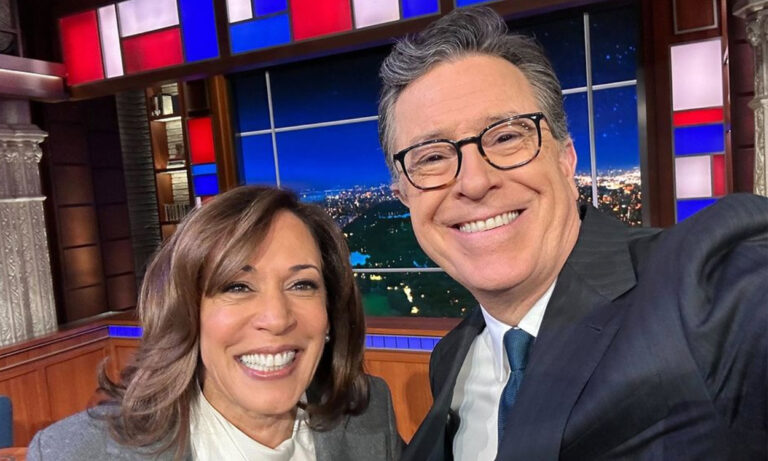Videos showing Kamala Harris heckled with ‘lock her up’ chant prove the Trump rhetoric is still alive
On Wednesday 15 March 2023, US Vice President (VP) Kamala Harris was heckled and screamed at as she left a taping of The Late Show With Stephen Colbert. Armed with a supply of iPhone cameras and American nationalism, crowds crammed themselves as close as they could get to the politician and chanted the phrase: “Lock her up.”
Three words that were once entirely synonymous with the anti-Hilary Clinton campaign of 2016, ‘lock her up’ has now become a mantra used primarily by Republicans to discredit, attack and intimidate female politicians in the country.
BREAKING: Kamala Harris was just heckled by protesters chanting “LOCK HER UP” after taping The Late Show with Steven Colbert pic.twitter.com/PiNorNDAb7
— Charlie Kirk (@charliekirk11) March 16, 2023
From the videos, it appears as though the protesters were concentrating on directing their anger towards Harris regarding the US’ involvement in the war in Ukraine, and clearly the ‘lock her up’ political chant suited their purpose.
Earlier today while waiting for Kamala Harris outside The Late Show with Stephen Colbert, protesters chant “lock her up!” One sign reads “Joe and Kamala fight in Ukraine yourselves” pic.twitter.com/ch1A95EJWx
— NJEG Media (@NJEGmedia) March 16, 2023
The VP has been subject to a mass amount of criticism since her inauguration in 2020. Harris is not only the first-ever female second-in-command, she’s also the second-ever person of colour to serve in that post—making her a prime target for bigots and white supremacists.
Who first came up with the ‘lock her up’ slogan aimed at Hilary Clinton?
Women have always faced obstacles when it comes to public office. Often deemed overly emotional, incapable of strategy, and inherently out of place—women in positions of political power are persistently required to justify themselves and their actions in manners their male counterparts are not.
For those of you who might not remember, the person who originated the infamous ‘lock her up’ chant was none other than former President Donald Trump. During the 2016 election campaign, Trump repeatedly tried to turn voters against Clinton by both implicating her in her husband’s multiple sexual assault allegations and insisting that the controversy surrounding her private email server leaks warranted her arrest.
However, what started as a chant regarding Clinton’s potential criminal acts quickly turned into a hate-filled slogan aimed at tearing down powerful women.
So, after videos of the Harris protests began to circulate online, the Twitter vitriol began to bubble over and pretty quickly, the ‘lock her up’ aspect of the clips led to some highly misogynistic and racist posts.
Lock her up!!!
— Janice L. Patterson (@2017_patterson) March 17, 2023
While some of the posts were highly unoriginal—lots of “get her!” and “fascist!”—some individuals provided some entertaining commentary. For example, one user stated: “They are all going to jail. We don’t want to hear any crying when it happens. It’s going to happen.”
Hate to break it to you @Cainly1, but I think Trump might be slightly higher on the wanted list.
Another individual posted: “She should be locked up for protecting Planned Parenthood, for the illegal selling of baby body parts and pointing out the journalist who uncovered it!!!! Just corrupt AS HELL!!!!”
Political slogans are powerful motivators, and “build the wall” and “make America great again” are two more prime examples of how Trump’s ascendancy is still massively impacting and shaping the current political climate and conversation. His face may no longer be at the forefront of people’s minds, but his rhetoric certainly is.






